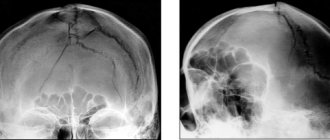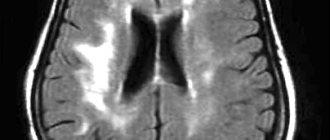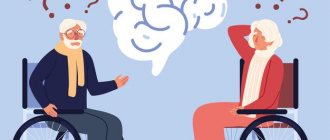Alzheimer's disease (otherwise known as senile dementia of the Alzheimer's type) is a lesion of the nervous system in which a person gradually loses mental abilities: memory, speech, the ability to think logically and navigate. This disease is considered one of the most severe forms of senile dementia.
Research shows that the cause of the disease is the disruption and subsequent death of neurons, the key cells of the central nervous system.
At-risk groups
The exact causes of Alzheimer's disease have not yet been established. Scientists today consider hereditary predisposition to be the key factor influencing its appearance. The genes responsible for the occurrence of this form of dementia have already been discovered. There is also a relationship between the disease and brain injuries and tumors, hypothyroidism, and exposure to toxic metals.
With Alzheimer's disease, changes occur in the structure of the brain at the cellular level - some nerve cells die, and glomeruli and plaques form from them, which disrupt the integrity of the nerve pathways and prevent the conduction of impulses along them. Such structures first accumulate in the parts of the brain responsible for memory and learning, and then spread to other areas, leading to an intensification of existing symptoms of the disease and the appearance of new ones.
It is curious that people engaged in intellectual work develop Alzheimer's disease much less frequently. Scientists attribute this to the formation of more nerve connections between brain cells. Thanks to multiple spare connections, the conduction of impulses along the nerve pathways does not stop even in the event of loss of function of individual neurons.
Main causes of death from lung cancer
How do people die from lung cancer? There are three main reasons:
- tumor metastasis to vital organs;
- acute respiratory failure;
- massive bleeding from the vessels of the lungs.
Since lung adenocarcinoma metastasizes to the pleura, mediastinum and surrounding tissues, the disease can have a lot of complications, which can also lead to death if timely assistance is not provided.
How long to live with metastases to the lungs? If we are not talking about a primary tumor in the lungs, but about metastases from another initial focus, the prognosis here is also disappointing. Regardless of where the primary tumor is located, the 1-year survival rate for distant metastases ranges from 30-40%.
Thus, survival and prognosis for lung cancer are generally unfavorable, but vary significantly depending on a number of factors. How long you can live and, most importantly, how, depends on the stage of the disease and on the doctors to whom the patient was treated. Therefore, you can entrust the most valuable thing for a person, life, only to competent specialists and a clinic with a name.
Prevalence
Alzheimer's disease is most often found in people over 65 years of age, but in rare cases, earlier onset occurs. According to statistics, the number of patients is increasing from year to year, which is associated not only with improved diagnosis, but also with a general increase in people’s life expectancy. If in 2006 almost 27 million people worldwide suffered from Alzheimer's disease, by 2050 this figure could quadruple. Women are slightly more likely to be diagnosed with senile dementia of the Alzheimer's type, but this may be due to their longer average life expectancy.
Signs
The course of Alzheimer's disease varies from person to person, but as a rule, it develops unnoticed and gradually progresses. The first symptoms are often ignored, considering a person’s strange behavior to be age-related or an atypical reaction to stress.
At the very beginning of Alzheimer's disease, patients experience short-term memory disorders - they forget what happened recently, but remember well events that happened 20-40 years ago. Gradually, long-term memory begins to suffer, and patients lose self-care skills. Ideas about safe behavior also suffer, which can cause premature death.
Common symptoms of Alzheimer's disease include:
- unreasonable anxiety;
- depression;
- delusional ideas;
- inability to recognize familiar objects and faces;
- forgetting individual words;
- violation of orientation in space and time;
- indifference to events happening around;
- problems with gait;
- inability to make decisions.
Behavior change is something that relatives of an elderly person should pay attention to first. The sudden transformation of a calm and balanced uncle into a “daredevil,” as well as the grandmother’s refusal of long-loved hobbies and activities, are a cause for concern and a visit to a neurologist.
Stages of Alzheimer's disease
Experts divide the course of Alzheimer's disease into 4 stages:
- predementia;
- early dementia;
- moderate dementia;
- severe dementia.
Symptoms of pre-dementia are often mistaken for natural aging of the brain, and yet they can be detected 8 years before the clear manifestations of Alzheimer's disease. The patient is unable to assimilate new information, remember a common word, or perform tasks of average complexity that he previously did almost on autopilot. People with the early stages of Alzheimer's disease have problems with planning tasks, abstract thinking, and lose flexibility in decision making.
During early dementia, memory impairment becomes more noticeable, although memories from the distant past are still not affected. Problems with speech may begin - a person begins to speak more slowly, his vocabulary becomes poorer, and it becomes more difficult to express his thoughts both orally and in writing. At the same time, the patient is still completely adequate. The accuracy of operations that require small movements suffers: drawing, writing, embroidering, fastening buttons. The person becomes awkward, clumsy. He continues to do many things on his own, but still needs regular supervision.
In moderate dementia, speech impairments are already quite noticeable - the patient forgets the appropriate words, tries to find a replacement for them with a similar meaning, but is often mistaken. Coordination of complex movements, reading and writing suffers, and urinary incontinence develops. Long-term memory deteriorates, a person may forget where he is, the way home, the faces of relatives. At this stage of the disease, the patient may become aggressive and irritable.
Severe dementia is an extreme degree of illness when the patient cannot control himself independently and is completely dependent on the help of others. His speech is very meager; as a rule, it comes down to individual words that are not always used appropriately. In some cases, there is a complete loss of speech function. At the same time, the ability for emotional contact is preserved - the person understands the emotions addressed to him and can even reciprocate.
In the last stage of Alzheimer's disease, the patient is in a state of apathy and powerlessness, although aggression may occasionally persist. Typically, such people lose the ability to independently make any movements, and self-care skills completely disappear. They mostly lie in bed, stop eating on their own and quickly lose weight. Death occurs from additional complications: pneumonia, infection of bedsores, etc.
Dependence on tumor type
Different types of tumors differ in location and aggressiveness, which significantly affects the success of treatment and life expectancy.
Ductal carcinoma
This is the most common type of malignant breast tumor. Ductal cancer is diagnosed in 78% of cases. The tumor can be round or star-shaped. The second option is characterized by a severe course of the disease.
At the first stage, it is possible to achieve a positive result in 92% of cases, at the second – in 65%, at the third – in 42%, and at the fourth – in 28%.
Lobular cancer
The tumor responds well to hormonal therapy. But due to its inaccessibility, diagnosis is difficult, which adversely affects the prognosis.
With grades 1 and 2 of lobular cancer, the five-year survival rate is 54%, and with grades 3 and 4, the three-year prognosis ranges from 2 to 12%.
Inflammatory cancer
Although the low-grade inflammatory type of cancer resembles mastitis, it is very aggressive. Even in the initial stages after surgical treatment, the survival rate is 45%.
Hormone dependent cancer
Due to vague symptoms, the tumor is usually detected at stages 2 or 3. The prognosis after hormone therapy is 27%.
Triple negative cancer
Cancer diagnosed at the first stage and properly treated allows for a 77% survival rate. At the second stage this figure is 42%, at the third and fourth stages it does not exceed 9%. Unfortunately, due to its high aggressiveness and rapid spread, the disease is usually detected in late stages.
Luminal
There are 2 subspecies: A
and
V.
_
Type A is sensitive to hormone therapy, due to which the prognosis at the initial stage reaches 94%
.
Type B is very aggressive and often recurs, which is why the survival rate does not exceed 46%
.
Diagnostics
People with Alzheimer's disease come to the attention of a psychiatrist and neurologist. At the first stage, it is important to collect an anamnesis about how the disease developed over time and to identify the presence of a hereditary predisposition.
To make a correct diagnosis, it is necessary to conduct a full examination and exclude diseases with similar symptoms (Parkinson's disease, Huntington's disease, tumors, hypothyroidism, cerebral atherosclerosis, etc.).
The examination must include:
- general blood analysis;
- hormonal status of the thyroid gland;
- blood test for HIV and syphilis;
- magnetic resonance imaging of the brain;
- electrocardiogram;
- electroencephalography;
- cerebrospinal fluid analysis.
In addition, there are special tests to test short-term memory, attention, speech, and self-care skills. They help determine the stage of Alzheimer's disease.
The diagnosis of Alzheimer's disease is made only after excluding diseases with similar symptoms. Mandatory diagnostic criteria are the gradual development of symptoms of dementia and progressive deterioration of memory. The diagnosis can be definitively confirmed by post-mortem histological examination of brain tissue under a microscope.
What does survival depend on?
Many factors influence life expectancy with breast cancer:
- tumor characteristics (stage, type, size, localization, invasiveness, aggressiveness, prevalence, extent of lymph node involvement, presence of metastases, presence of the Her2neu mutation in the genotype);
- previous treatment, sensitivity of the tumor to hormonal drugs;
- professionalism of the surgeon;
- individual characteristics of a woman (age, general health, emotional state);
- compliance with doctor's recommendations, maintaining a healthy lifestyle.
Treatment
Unfortunately, there is no cure for Alzheimer's disease or slow the progression of the disease, but medications can help relieve symptoms. To correct cognitive impairment, drugs from the group of cholinesterase inhibitors (physostigmine, galantamine, proserine) and memantine are prescribed. Antipsychotics are used for aggression, psychosis and behavior problems, although their long-term use in dementia increases the mortality rate.
A very important aspect of the rehabilitation of patients with Alzheimer’s disease is psychosocial support, training relatives in behavioral tactics and care skills. A sick person should not feel like a heavy burden or disabled. Art therapy, hippotherapy, music therapy, etc. can be used as an auxiliary treatment.
What causes Alzheimer's?
Alzheimer's disease is quite widespread, but so far it has not been possible to establish the exact cause of its development. However, it is worth noting that this disease most often occurs in elderly patients. The fact is that as the body ages, the production of certain hormones slows down significantly.
But old age is not the main factor, since in some cases pathology can be found even in middle-aged people - from 45 to 50 years. The disease can be observed even in young people whose life and work are associated with constant physical activity and injuries. There are often cases when mental disorders were detected in professional athletes.
Some of the latest research by scientists has shown that the main cause of the development of dementia is a low level of intellectual activity. Thus, among educated people, signs of senile dementia are detected least often. But this factor cannot provide a 100% guarantee of protection against this disease. In medical practice, cases of the development of dementia in famous scientists and politicians have been recorded.
Experts have identified categories of people in whom memory and mental activity disorders practically do not occur:
- polyglots - people who perfectly know several foreign languages;
- film and theater actors;
- chess players.
Evidence and research suggest that an active brain can prevent dementia, at least in early life. But to achieve this goal, you need to constantly train your thinking.
It is believed that this pathology most often affects women. Experts attribute this to the fact that the life expectancy of the fair sex is longer. The disease is rare in men because many do not live to the age when Alzheimer's begins to develop.
Also, due to hormonal changes during menopause, women’s bodies become more vulnerable to changes of this nature. If you do not prescribe therapy that helps slow down hormones during this difficult period, the risk of complicated pathologies increases.
Daily contact with chemicals and toxic substances can also contribute to the development of dementia. Thus, people who work in hazardous industries for a long time are at risk. Exposure to free radicals in the body can also cause dementia.
However, a number of the unfavorable factors listed above are not in all cases capable of triggering the onset of Alzheimer's disease. Often these reasons are not present in the patient’s medical history.
In addition to external factors, there is also a genetic predisposition to dementia. It is considered one of the main reasons for the manifestation of this pathology. Thus, if one of the parents suffered from this disease, there is a high probability that it may appear in the future in children.
How is the disease diagnosed?
An absolutely accurate diagnosis is made only after the death of the patient based on the results of the autopsy. Any diagnostic measures are based on assumptions.
People suffering from Alzheimer's disease are prescribed special testing to determine memory impairment. Thanks to a general blood test, other organ pathologies or inflammatory processes in the body can be identified.
In some cases, the following diagnostic examinations are prescribed:
- magnetic resonance imaging - allows you to identify benign and malignant tumors in the brain;
- computed tomography - helps to examine the layers of the brain;
- biochemical blood test - carried out to identify hormonal disorders.
Any diagnostic methods can only be prescribed by a doctor, based on the individual characteristics of the body. It is of great importance what symptoms Alzheimer provokes and their possible connection with age-related changes.
How is Alzheimer's treatment done at different stages?
Since in some cases the pathology is caused by hypertensive disorders, increased cholesterol levels or diabetes, the first thing to do for treatment is to eliminate these unfavorable factors. If initial signs of pathology are discovered, you should not fall into depression. Modern drug therapy can affect symptoms and slow down the development of the process.
Since Alzheimer's disease is most often observed in women, it is recommended that they periodically undergo a complete diagnosis. In the final stages of pathology, doctors will no longer be able to help. In these cases, only symptomatic therapy is carried out. Unfortunately, even today scientists have not found a universal remedy that could permanently get rid of this common problem in old age.
In some cases, mental disorders can provoke uncontrollable attacks of aggression. If any are detected, the patient is prescribed drugs from the group of tranquilizers.
A balanced diet is of great importance for successful treatment. Patients with Alzheimer's disease need to reduce their intake of sweet, fatty foods. A person’s diet should contain exclusively healthy foods. Experts note that the components contained in seafood are especially effective for people suffering from dementia. Patients who experience complete loss of mobility are advised to eat more fresh fruits and vegetables to avoid problems with bowel movements.
If a person suffers from Alzheimer's disease, it is necessary to provide not only treatment, but also careful care. Only in this case will the therapy be effective. All the necessary special conditions for patients with dementia have been created in the boarding houses of the Trust network.
What is the prognosis for Alzheimer's patients?
Doctors focus on the stage of development of the pathology and the existing symptoms. In some patients, when the first signs of dementia are detected, rapid progression of Alzheimer's occurs. Usually in this case the prognosis is disappointing.
The duration of Alzheimer's disease is reduced with timely diagnosis and professional treatment. Therapy should be carried out strictly under the supervision of specialists.
Preventive measures for senile dementia
Unfortunately, if there is a genetic predisposition to the disease, it is almost impossible to stop its progression. But active intellectual activity is one of the most effective ways of prevention.
In addition, patients suffering from Alzheimer's disease are advised to follow these guidelines:
- eliminate bad habits from your life - if you have any, you should get rid of them;
- ensure yourself a healthy, full night's rest - you need to sleep at least 8 hours a day;
- adhere to proper nutrition - eat only healthy foods rich in vitamins and nutrients.
If the first symptoms of Alzheimer's disease are detected, you should immediately seek advice from specialists. Do not forget that any disease is much easier to prevent than to cure.
The Trust boarding house network is ready to provide assistance in the treatment and prevention of Alzheimer’s disease. Our private nursing homes are equipped with everything necessary for the successful rehabilitation of patients. In addition, we have created decent living conditions. Boarding houses are located in Butovo, Solnechnogorsk and a number of other areas of the Moscow region with the most favorable environmental conditions.
We also provide a number of rehabilitation procedures under the compulsory medical insurance policy completely free of charge. You can find out more about treatment and book a place at the Doverie boarding house by calling or ordering a call back.
Forecast
It has been established that patients suffering from Alzheimer's disease live shorter lives than their peers. The average life expectancy after diagnosis is about 7 years. The mortality rate is increasing due to the increased number of injuries, falls, traffic accidents and other accidents. In 70% of cases, patient death occurs due to the development of Alzheimer's disease itself - due to dehydration or pneumonia.
Recommendations for relatives
The burden of care and responsibility for the health of a person with Alzheimer's disease falls primarily on loved ones. Most patients prefer to live within the walls of their own home rather than a nursing home, and this requires the creation of special conditions, changes in the routine and habits of the family.
It’s hard for loved ones to watch how the disease progresses and their loved one changes. The most correct thing in this situation would be to seek professional help from a psychotherapist who works with this group of patients. Many people find it helpful to communicate with relatives of other patients: it allows them to learn from experience and receive the necessary emotional support.
The Mednavi company cooperates with leading neurological centers in Russia and the world. We know where to turn for help and will help organize treatment. Take advantage of our knowledge and experience, contact a Mednavi specialist.
Forecast for men
Although it seems strange to many, men are also diagnosed with breast cancer, although it is extremely rare. At the same time, the treatment prognosis for men is much worse. This situation is explained by the fact that men do not suspect the existence of a problem and in 50% of cases they seek medical help too late.
In 100% of cases, men are indicated for surgical treatment of breast cancer, after which they undergo hormone therapy, which allows in 36% of cases to achieve stable remission for a year and a half. Chemotherapy can improve the 5-year prognosis to 70%. But with stage 4 tumors, the rate drops to 47%.
How long do you live with breast cancer?
It is impossible to answer the question unambiguously, since each case is individual. There are known situations where, in the most hopeless cases, thanks to the professionalism of doctors and the optimism of patients, it was possible to defeat an insidious disease.
In addition, it should be taken into account that the general prognosis includes patients who categorically refuse treatment for breast cancer, which significantly reduces life expectancy. Therefore, even a minimal percentage of survival is a chance for recovery.
Therefore, it is so important to get advice from competent specialists in a timely manner so that quality treatment can be prescribed.
has been organizing high-quality individual medical care for many years.
Over the years of work, we have accumulated statistics on leading foreign clinics and are ready to recommend to patients for treatment of various stages of the mammary gland only those medical centers that will truly provide the most effective care.










